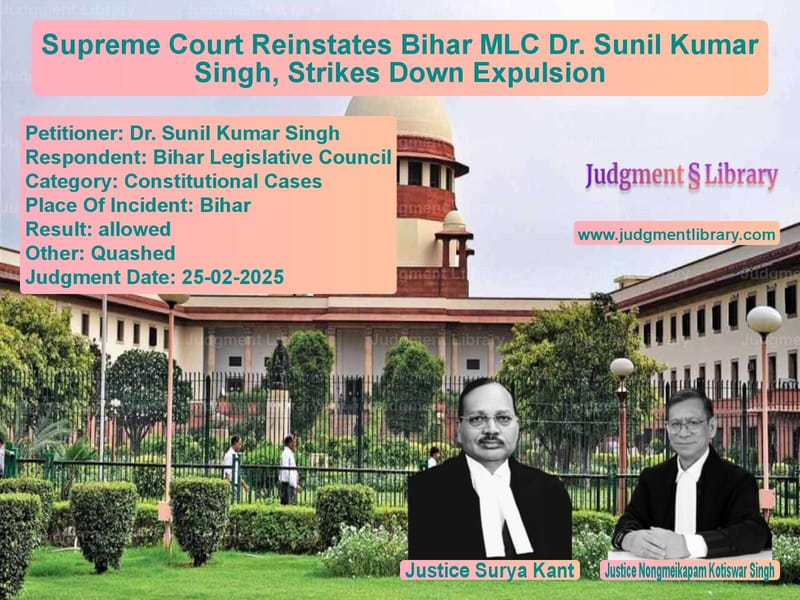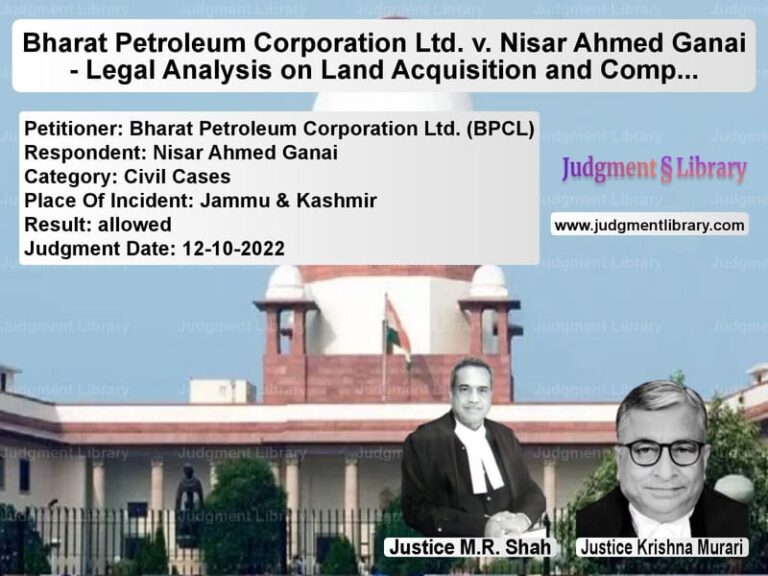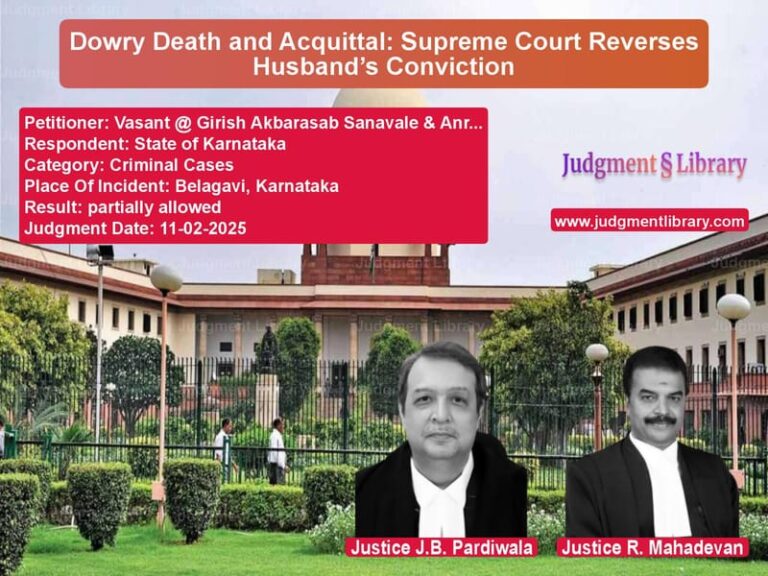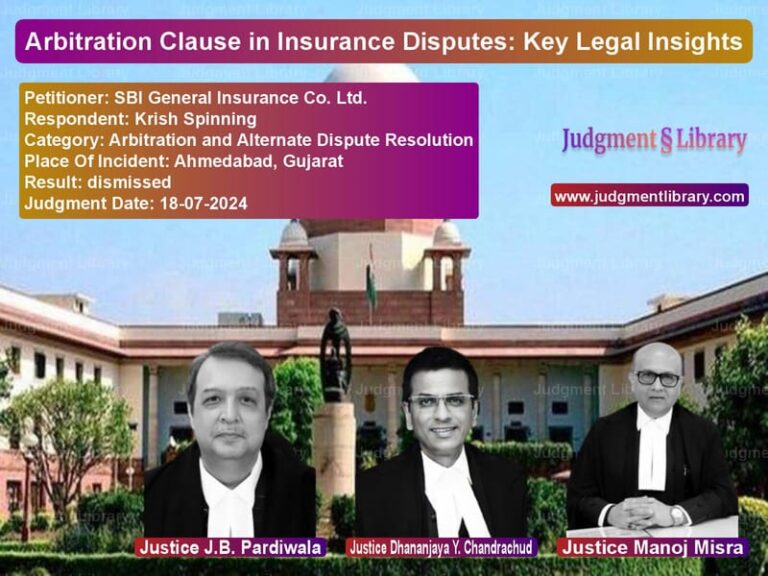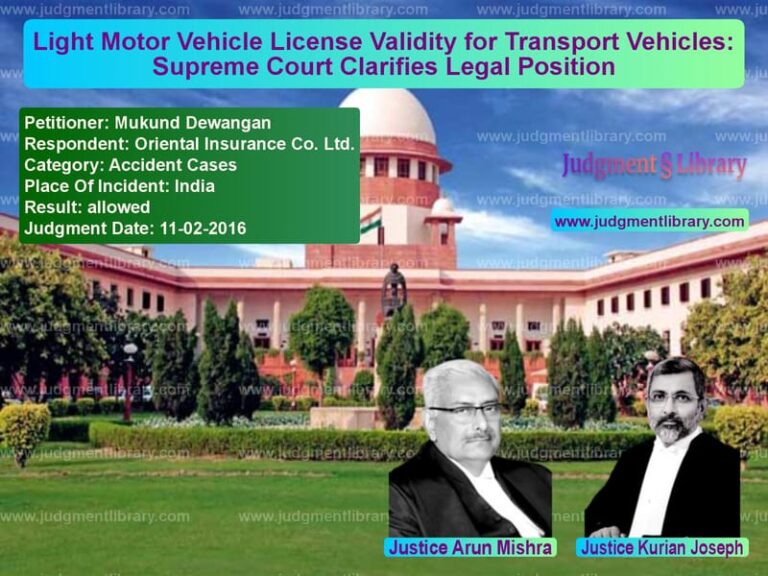Supreme Court Reinstates Bihar MLC Dr. Sunil Kumar Singh, Strikes Down Expulsion
The Supreme Court of India, in its judgment dated February 25, 2025, reinstated Dr. Sunil Kumar Singh as a Member of the Bihar Legislative Council (BLC) and set aside his expulsion. The Court ruled that the punishment imposed on him was disproportionate to the alleged misconduct. However, it clarified that he would not be entitled to remuneration for the period of expulsion.
Background of the Case
Dr. Sunil Kumar Singh, an elected member of the Bihar Legislative Council (BLC) from the Rashtriya Janata Dal (RJD), was expelled following a resolution passed by the House based on the recommendations of the Ethics Committee. The expulsion stemmed from allegations of using derogatory language against the Chief Minister during a legislative session on February 13, 2024.
Read also: https://judgmentlibrary.com/supreme-court-dismisses-pil-on-reservation-policy-in-medical-admissions/
The Ethics Committee found that Dr. Singh, along with another MLC, Md. Sohaib, had obstructed the House proceedings by using offensive remarks against the Chief Minister and engaging in disruptive behavior. While Md. Sohaib was suspended for two days, Dr. Singh was expelled from the House.
Petitioner’s Arguments (Dr. Sunil Kumar Singh)
The petitioner challenged his expulsion on the following grounds:
- The punishment was disproportionate compared to that of his co-accused, Md. Sohaib, who was only suspended for two days.
- He was denied access to critical evidence, including video recordings of the incident, which was against the principles of natural justice.
- The Ethics Committee preponed the proceedings from June 19, 2024, to June 14, 2024, without informing him, denying him a fair opportunity to defend himself.
- The recommendation for his expulsion was politically motivated, as he was a prominent opposition leader.
Respondents’ Arguments (Bihar Legislative Council and Others)
The respondents, represented by senior counsel, argued:
- The Ethics Committee followed due process and provided multiple opportunities for Dr. Singh to present his defense, which he deliberately avoided.
- The petitioner’s conduct was disruptive and unprecedented, justifying a stricter punishment.
- The decision to expel him was passed by a majority in the House and should not be subject to judicial review.
- Under Article 212 of the Constitution, legislative proceedings should not be questioned on procedural grounds.
Supreme Court’s Observations
The Supreme Court addressed key legal issues and ruled:
“There is no absolute bar on the Constitutional Courts to examine the proportionality of the punishment imposed on a Member while reviewing the validity of the action taken by the House.”
The Court rejected the argument that legislative decisions were beyond judicial review, stating that:
“While the legislature has autonomy to regulate its affairs, its actions must align with constitutional principles, including fairness and proportionality.”
The Court also noted:
“The petitioner’s misconduct warranted disciplinary action, but the expulsion was excessive compared to the two-day suspension imposed on Md. Sohaib.”
Final Judgment
The Supreme Court ruled:
- Dr. Sunil Kumar Singh’s expulsion was disproportionate and is set aside.
- The period of expulsion already served shall be deemed as suspension.
- Dr. Singh is reinstated as a member of the Bihar Legislative Council with immediate effect.
- He shall not receive any remuneration for the period of expulsion but will be entitled to post-tenure benefits.
- The bye-election scheduled for his vacant seat is quashed.
Impact of the Judgment
This ruling reinforces several key legal principles:
- Judicial Oversight of Legislative Decisions: The judgment clarifies that legislative actions affecting fundamental rights are subject to judicial review.
- Proportionality in Disciplinary Actions: The Court reaffirmed that punishment must align with the severity of misconduct.
- Fairness in Legislative Ethics Proceedings: The ruling underscores the need for transparency and due process in parliamentary disciplinary actions.
- Political Neutrality in Disciplinary Measures: The Court emphasized that disciplinary actions should not be influenced by political considerations.
Conclusion
The Supreme Court’s ruling in Dr. Sunil Kumar Singh vs. Bihar Legislative Council sets a precedent in balancing legislative privileges with constitutional safeguards. It ensures that members of the legislature are held accountable while protecting them from arbitrary or politically motivated actions. By reinstating Dr. Singh, the Court has upheld the principles of fairness, justice, and democratic representation.
Petitioner Name: Dr. Sunil Kumar Singh.Respondent Name: Bihar Legislative Council.Judgment By: Justice Surya Kant, Justice Nongmeikapam Kotiswar Singh.Place Of Incident: Bihar.Judgment Date: 25-02-2025.
Don’t miss out on the full details! Download the complete judgment in PDF format below and gain valuable insights instantly!
Download Judgment: dr.-sunil-kumar-sing-vs-bihar-legislative-co-supreme-court-of-india-judgment-dated-25-02-2025.pdf
Directly Download Judgment: Directly download this Judgment
See all petitions in Fundamental Rights
See all petitions in Legislative Powers
See all petitions in Public Interest Litigation
See all petitions in Judgment by Surya Kant
See all petitions in Judgment by N. Kotiswar Singh
See all petitions in allowed
See all petitions in Quashed
See all petitions in supreme court of India judgments February 2025
See all petitions in 2025 judgments
See all posts in Constitutional Cases Category
See all allowed petitions in Constitutional Cases Category
See all Dismissed petitions in Constitutional Cases Category
See all partially allowed petitions in Constitutional Cases Category

